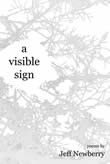
|
A Visible Sign, the debut chapbook by Jeff Newberry (and nominee for the Conference on Christianity and Literature’s Book of the Year Award), gathers poems desperate for the slippery tangibility of spiritual significance. Throughout the collection, Newberry’s lines both comfort and question. There are moments of humor and doubt, prophecy and supplication, yet an endearing sense of warmth resides at the core of everything. Split into three sections, A Visible Sign engages a wide array of themes, from a philosophical pondering of God’s existence, to the bleak diagnosis of terminal cancer. Throughout, Newberry remains personal and poignant. It’s not surprising that these poems have a big heart beating at the center of them, one that is not afraid to speak what most would leave unsaid. “Things Unseen” offers a remembrance of the speaker’s father. Its opening is neither self-defense nor self-indictment: “At my father’s grave, I’ve never knelt. / Never said a prayer, never written a letter / & burned it to send smoke spirals to // A world of spirit.” The lack of a symbolic gesture isn’t meant to convey apathy or anger or indifference toward the father, but rather a greater understanding of the nature of mortality and the finality of death. If the father survives, the speaker concludes, he survives in memory alone, in “The faded blue of a 1974 Buick, / The shining grease that used to part his hair, / The oiled leather of a baseball glove....” Don’t get the impression, however, that Newberry is forsaking the spiritual. Hardly. His words often show us how poetry, along with memory, stands as one of the visible signs of spirituality he’s after. “I pray for an image,” one poem begins. Even still, poetry can only represent the spiritual world, and it certainly can’t replace it. Newberry’s poems admit as much when the book’s closing poem claims, “Every image tells the same speculated lie.” The title poem of the collection, tells the story of two small-town brothers left to mimic the heroic life on the sea that they imagine their father has lived as a sailor. Obviously, the both have come to worship and mythologize the father. No matter how hard they try, though, we know they’ll never come close to recreating what they so desperately long for: the hard truths of their father’s nameless experiences. Instead, the boys are left to “Dream constellations in a gunmetal sky,” perhaps the first of the hard truths of their own lives. In a book so focused on matters of faith, it’s a testament to the work of Newberry that such a consolation prize is as beautiful and comforting as it is a metaphor for the nature of faith. --Jay Robinson
|
